Railway
Lagos to Ibadan rail: Proof of pudding is in the eating
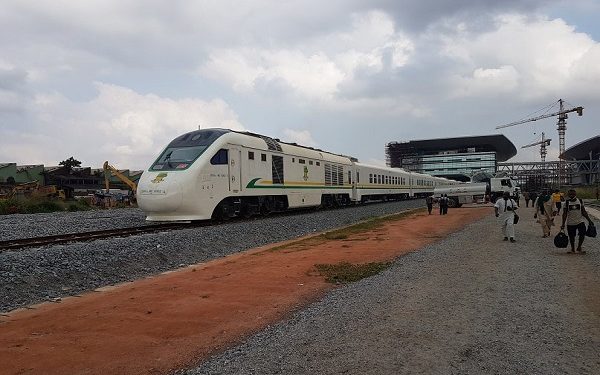
Life is gradually returning to the rail track leading from Lagos to Ibadan, the Oyo State capital. PAUL ADE-ADELEYE shares his experience
After much talk, some animosity and a burst of determination, the Lagos to Ibadan rail line finally kicked off activities low-key on December 7. Although its maiden trip was mocked for recording generally low patronage, the fault did not lie with the quality of service on offer; neither did it lie, contrary to popular opinion, with the fare of commuting. A return journey to and from Ibadan last week Wednesday, turned out to be exhilarating.

- Train host/hostesses
Everyone has said it, so it is no secret that none of the train stations on the 156km route is complete at the moment. The closest to completion is the Lagos terminal at Ebute Metta in Lagos Mainland. When completed, the terminal has been touted to match international standards. A cursory glance at the level of work ongoing at the station seems to point to the absence of any fib on the part of those who believe that the new terminal will be of high quality. Awaiting the comfort of the new terminal, however, Lagos District Manager of the Nigeria Railway Corporation (NRC), Jerry Oche, took it upon himself to ensure that travellers were well treated.
Inviting the first five travellers to arrive at the Lagos Station to the conference room of the old terminal last Wednesday, the manager fielded questions and even served drinks, apologising that the waiting area and ticketing booth were not ready. One traveller wondered aloud why there was little publicity concerning how the train would work, especially as most travellers simply had to grope their way through the procedure leading up to boarding the train. Mr Oche, an engineer, however, revealed that the absence of fanfare and advertorial that would serve as official publicity for the commencement of the train service was deliberate.
Officially, the train service has not been commissioned. This will be done by President Buhari sometime in January by which time it is hoped the project would have been completed. Meanwhile, the bit-part launching of the train service means that with current operations, the train can sit as many as 580 people. At the moment, especially since the station is not completely ready and there is no secure waiting area, it may be difficult to manage such a number. Oche is reluctant to kick-start operations at full capacity when the facilities to manage such numbers are not yet completely available. For now, he appears content to let the train service announce itself, a strategy that appears to be yielding dividends.
The district manager is additionally confident that this can be a successful strategy because the train service had conducted a free trial from Iju to Ibadan and only the COVID-19 pandemic stopped the service. When the trial started, they recorded low turnout but soon the numbers skyrocketed and maximum patronage was recorded at every journey.
Facilities
The reporter arrived at the train station with the intent of travelling humbly. Humility must be understood to mean economy class. However, when the booking clerk would ask what class of commuting the reporter wanted, a strange whim caused the reporter to opt for first class.
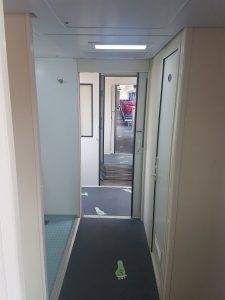
- The passage
The first-class coach, which seats 24 passengers, costs N6,000; the business class coach, which seats 56 passengers, costs N5,000; while the economy coaches cost N3,000 for the 68-seater coach and N2, 000 for the 88-seater coach.
Luxury is an addictive spirit, so let it suffice to say that the return journey was first class also. Whatever the financial effects of this deluxe treatment of self, the devil may care but the reporter does not. To purchase a train ticket, the prospective commuter must present some form of identification – no doubt for security purposes.
Despite the incompleteness of the rail station, the manager was keen on security. He mandated that only travellers were to be on the ramp leading up to the train during boarding hours. There are also contracted security personnel belonging to several paramilitary bodies who embark on every train ride for the safety of the passengers. No staffer without business on the train was to be in the vicinity. At the entrance of the train, courteous staff (a welcome improvement in Nigeria) greeted the passengers, and the train not to be outdone, also breathed a cheeky draught of cold air. The trip, this implied, would be fully air-conditioned. The train was not complaining, the employees were not, and the passengers certainly were not. That consensus being reached, the reporter did not begrudge the train hostess leading him to the first class session – he paid for it anyway. There were sinks on the train, restrooms and a mini-bar from which nourishment was to be served for the pleasure of travellers.
Cross-checking this array of amenities with a contact in the United Kingdom confirmed that the regular metro trains do not offer this luxury. Only the long-distance trains, which operate between counties, do. While the economy and business class carriages looked comfortable enough, the reporter cannot say much for them, having only passed through. The first-class coach, however, was what it promised. The seats had trays, which could be summoned or neatly tucked away according to the traveller’s preference. The seats could also be rotated a full 360 degrees should the traveller not enjoy the sensation of being in reverse as the train rolls along. Trains, you see, hardly turn. There are engines at both ends, which propel the train depending on the train’s direction, and so the traveller is either travelling backward or forward.
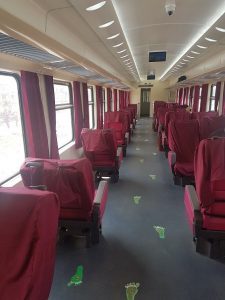
- Interior of the First Class coach
At exactly 4 pm, the train departed the station. The passengers had been warned that the trip would last 2:41 hours. There are stations in Agege, Alagbado, Kajola, Abeokuta, Papalanto, Olodo, Omi Adio and finally Moniya, Ibadan, but for now, only the Abeokuta station is a stopping station. The stop was for only five minutes, and, as promised, at exactly 6:41, the train rolled into the Ibadan station. Similarly, the next morning, the train departed Ibadan by exactly 8 am and was in Ebute Metta at exactly 10:41 am. At maximum speed, the train is expected to eat up the distance at the rate of 150km/hr. The precision was encouraging for it meant a fellow could work his schedule around the train schedule. Mr Oche noted that when the train service became fully operational, it could make as many as 16 trips daily with a train departing and arriving every other hour. The journey could have been shorter, but people trading on the rail lines have forced the train to virtually crawl through Lagos, picking up speed from Alagbado station.
Verdict
For the current prices, the Lagos-Ibadan rail service is worth the expenditure. As noted by many analysts, the advantages floor whatever financial inconvenience the traveller may experience. For N2,500, the commuter who has chosen economy class will get more than double the comfort that a traveller by road would hope to enjoy in public transport. The traveller again enjoys additional guarantee that they will arrive at their destination in one piece and at a pre-arranged time. The business class traveller, for only N5,000, will enjoy more exclusivity and can make use of a laptop or other such device as may be reasonably sized for their work. It is presumed that the first-class passenger has called congress in his mind and deliberated on what premium can be placed on comfort and luxury in travelling. Honeymooners or those who do not like crowded spaces are advised to travel first class. It offers comforts that even luxurious private vehicles struggle to match.
The fear, as with many other things in Nigeria, is the maintenance culture. It was lack of proper maintenance and farsightedness that led to the decline of the railway system which the British bequeathed. The NRC must be careful not to rest on its oars but seek new and better ways to innovate rail travel, for only by so doing can the current pace be sustained and evenly matched. The District Manager predicts that by February, the stations will be completed. It is difficult to see how that is possible.
-The Nation
Railway
House committee on Land Transport tours NRC facilities, moves for railway unbundling

House committee on Land Transport tours NRC facilities, moves for railway unbundling

The House of Representatives is taking steps towards the unbundling of the Nigerian Railway Corporation to fully deregulate the industry and encourage more private sector investments.
Chairman, House Committee on Land Transport, Blessing Onuh, stated this on Friday after leading members of the committee on a visit of the NRC facilities on the Lagos corridor.
She spoke a few months after the railway development/management was moved from the exclusive legislative to concurrent list giving state governments powers to build and operate railway systems.
Onuh, daughter of the former Senate President Senator David Mark, who is representing the Otukpo/Ohimini Federal Constituency, said a bill for the unbundling of the NRC was already before the House of Representatives.
“The unbundling will allow people to come in and develop the rail sector,” she noted.
She also said, “The bill has passed the first reading. Hopefully, it will be coming for second reading shortly.
“That bill is a proposed bill to unbundle the Nigerian Railway Corporation (NRC) to allow companies to come in; to allow private partnership (firms) to invest in the rail sector and that will enhance development.”
She said an effective railway transport system would enhance the socio-economic development of the country.
She stressed that the committee would provide the needed legislative support for the rail transport mode to thrive.
“Rail transport is very vital to the development of every nation. So, we need to encourage the railway transport sector,” she said.
Onuh said they were during the facility tour taken through the various units of train operations by the NRC Managing Director, Mr Fidet Okhiria and other management team, including the Alex Ekwueme Control Tower, before boarding the standard train at the Mobolaji Johnson Train Station in Lagos for a trip to Ibadan.
She said the team made a stopover at the Kajola Wagon Assembly Plant (KWAP), where the committee was informed that the facility was one of the Corporate Social Responsibility’s contributions by the Chinese contractors to the Nigerian government.
NRC MD Okhiria also spoke on the central control centre, saying it had not been activated due to unstable power supply, adding that efforts were underway to develop a stable energy source as well as a back-up energy to enable the control centre monitor everything happening on the entire railway corridor.
Railway
State trains: Plateau, Niger, Osun, Borno set to join Lagos, FCT

State trains: Plateau, Niger, Osun, Borno set to join Lagos, FCT
Plateau, Niger, Borno and Osun states are among state governments currently making arrangements to run train services within their respective areas.
They are joining Lagos State Government and the Federal Capital Territory already operating and managing mass transit train services for the people in those places.
This is coming after the railway development and operation was moved from the exclusive legislative list to concurrent allowing states and private sector to be involved in the business.
Managing Director of the Nigerian Railway Corporation, Fidet Okhiria, disclosed this in Lagos on Tuesday during a public lecture.
Okhiria spoke as a guest lecturer at the endowed professorial chair on Transport and Logistics at the Lagos State University (LASU) on ‘From exclusive clause to concurrent list: Potency for sustainable rail infrastructure development in Nigeria and the Lagos State Example’.
He commended the Lagos State Government and the Federal Capital Territory, Abuja, two subnational governments for effectively initiating and running mass transit trains.
He said it was part of the fallout of moving the railway development from the exclusive list to current as signed into law in March 23, 2023 by the ex-President Muhammadu Buhari.
Already, he said the Plateau State Government had commenced a trial run of its stage-managed train service.
Okhiria said, “Lagos State is one of the states already operating a mass transit train in Nigeria. The Lagos Blue Line is a standard gauge track operating between Mile 2 and Marina…The service has greatly reduced the traffic jam usually experienced at Marina to Orile and Mike 2 axis, especially usually during peak hours.
“Lagos State is presently at an advanced stage of commenting the Red Line from Agbado to Oyingbo. We are currently inspecting and certifying various operating equipment along the corridor for safety concerns. When the service commences, it will greatly impact the way Lagosians travel.
“Other states are already keying in before now, using our track access tool to negotiate a train service within their corridor.
“Notable among them included Plateau State Government, already operating on trial runs, Niger State (talks ongoing), Borno State (talks ongoing), Osun State Government (hire service during festivities) and the Federal Capital Territory (FCT) currently restated, to mention a few.”
The NRC boss recalled that the prior to the constitutional amendments, was both a sole operator and regulator of rail activities in the country.
He cautioned states against dropping standards due to the high cost involved in building railway infrastructure, which he noted could affect safety.
Okhiria said the NRC would continue to offer necessary technical advice and other input to ensure adherence to uniform global standards in railway development and management.
He urged private investors to key into the project in the area of running trains, both passengers and freight.
Vice-Chancellor of LASU, Prof. Ibiyemi Tunji-Bello, represented by the VC Administration, Prof. Adenine Omotunde Boyo, said that the removal of railway from exclusive to concurrent list would empower the states to invest massively railway business and boost the intermodal transport system.
She commended the initiative of the Lagos State Government for completing and commencing daily commercial train service from Mile 2 to Marina.
Speaking on the professorial chair endowment in the transport studies at LASU, Prof. Dele Badejo said it was the first of its kind in transport development and sustainable development in sub-Sahara Africa.
He said, “This guest lecture is historic because it is the first time that the endowment has gathered and assembled stakeholders and intellectuals in the rail transport sub-sector to brainstorm and provide a road map for the repositioning and improving various activities and infrastructure on rail transportation.”
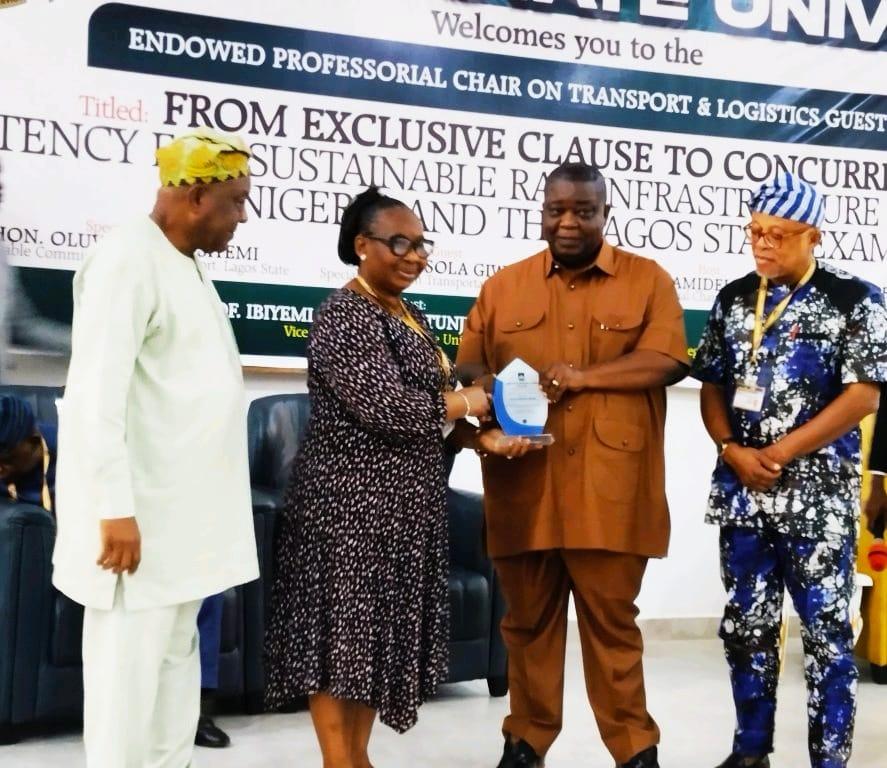
Railway
We’re ready to move livestock from North to South – NRC MD

We’re ready to move livestock from North to South – NRC MD
The Nigerian Railway Corporation (NRC) says it will soon resume transportation of livestock from north to south.
The service was suspended in 2017 due to technical glitches.
Fidet Okhiria, managing director of the NRC, disclosed the planned resumption of the service on Wednesday when he appeared on ‘Morning Brief,’ a Channels TV programme.
Okhiria said the transportation of livestock and goods would recommence via the Warri-Itakpe route.
On Tuesday, President Bola Tinubu hinted at the possibility of creating a ministry of livestock development.
READ ALSO:
- BREAKING: ECOWAS court finds Nigeria guilty of rights abuse at Lekki tollgate
- BREAKING: Tinubu invites labour for minimum wage talks
- Bread scarcity hits Kaduna, Katsina, Kano
Okhiria said the NRC would modernise the movement of goods in the country “so that when they come by road from the north, they can move them by rail to south-south Warri”.
The MD added that the NRC has “brought in some wagons that can mobilise livestock and they are being assembled in the Kajola area of Oyo in the south-west”.
He said railway investments should prioritise people’s wellbeing over profit for indirect economic benefits.
“We’ve built 15 wagons for livestock and maybe in the next month or two, they would be deployed from Itakpe to Warri to drive the economy,” he said.
“You are not developing transportation because you want to make a profit in terms of naira and kobo, but the profit will come indirectly if we can move goods and link cities.”
We’re ready to move livestock from North to South – NRC MD
-

 News2 days ago
News2 days agoNLC can’t withdraw from protest it didn’t organise – Ajaero
-

 News3 days ago
News3 days agoNorthern group attacks Reps Minority Caucus for demanding Nnamdi Kanu release
-

 News2 days ago
News2 days agoFG unveils training programme for 1,000 Nigerians in AI, blockchain
-

 News2 days ago
News2 days agoMinimum wage: Akpabio says domestic workers can’t earn less than N70,000
-

 International13 hours ago
International13 hours agoNetanyahu, Biden hold talks over tense Gaza ceasefire
-

 Africa3 days ago
Africa3 days agoDozens arrested in Uganda anti-government protests
-

 News3 days ago
News3 days agoDangote refinery: MAN cautions against demarketing local investments
-

 metro2 days ago
metro2 days agoWanted Lagos drug baron, Temo, arrested



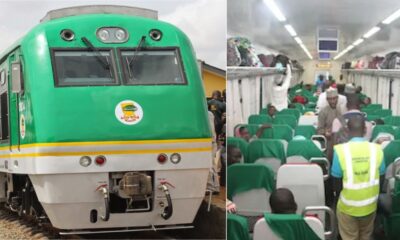

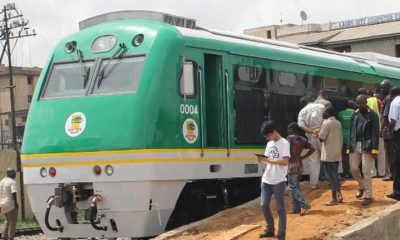




You must be logged in to post a comment Login